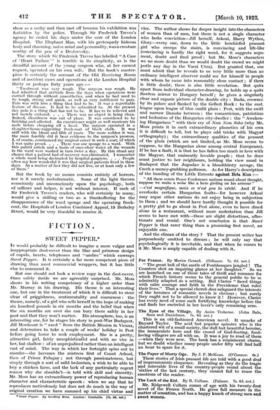FICTION.
SWEET PEPPER.*
IT would probably be difficult to imagine a more vulgar and inappropriate dust-cover than the lilac and primrose design of cupids, hearts, telephones and "undies" which enwraps Sweet Pepper. It is certainly a far more competent piece of drawing than most commercial wrappers, but it has little else to commend it.
But one should not look a review copy in the dust-cover. Once safely inside we are agreeably surprised. Mr. Moss shows in his writing competency of a higher order than Mr. Murray in his drawing. His theme is an interesting one, but one in the treatment of which it is difficult to steer clear of priggishness, sentimentality and coarseness : the theme, namely, of a girl who sells herself in the hope of making six hundred pounds in six months and the belief that when the six months are over she can bury them safely in her past and that they won't matter. His atmosphere, too, is an interesting one, for he stages his story in post-War Budapest. Jill Mordaunt is " axed " from the British Mission in Vienna, and determines to take a couple of weeks' holiday in Pest before going home to seek employment. She is a pretty, attractive girl, fairly unsophisticated and with no vice in (ier, but shallow : of an unprejudiced rather than an intelligent cast of mind. The way in which her fortnight spins out to months—she becomes the mistress first of Count Arkozi, then of Prince Palugay ; not through passionateness, but simply through a sort of mild hedonism, a wish to be able to buy a chicken farm, and the lack of any particularly cogent reason why she shouldn't—is told with skill and sincerity. Mr. Moss has an extraordinary power of reproducing human character and characteristic speech : when we say that he reproduces meticulously but does not do much in the way of original creation we have summed up his chief virtue and
• Sweet Pepper. By Geoffrey Moss. London : Constable. 17s. 6d. net.) vice. The author shows far deeper insight into the characters of women than of men, but there is not a single character who lacks conviction—Jill herself, Arkozi, Harry Wythes, Glory—every one, down to the little kerchiefed peasant girl who sweeps the stairs, is convincing and life-like (convincing is hardly the right word, for it suggests argu- ment, doubt and final proof ; but Mr. Moss's characters we no more doubt than we would doubt the crowd we might jostle any day in the Vaczi Utca). But granted that, one must admit that he reveals to us very little more than an ordinary intelligent observer could see for himself in people with whom he came into reasonably close contact ; if there is little doubt, there is also little revelation. But quite apart from individual character-drawing, he holds up a quite flawless mirror to Hungary herself ; he gives a singularly clear and organic picture of the double city : Buda, crowned by its palace and flanked by the Gellert Rock : to the east, league upon league of blue sunlit plain : Pest, with the swill and narrow Danube between : the romanticism, patriotism and hedonism of the Hungarian city-dweller : the " Awaken- ing Hungarians" with their cry of Nem Nem Soho (why Mr. Moss prints it in such extraordinary phonetics of his own it is difficult to tell, but he plays odd tricks with Magyar orthography) ; the extraordinary qualities of the peasant of the plain (which are not limited, as Mr. Moss seems to suppose, to the Hungarian alone among central Europeans). If he has a fault, it is that he has fallen too much in love with the Magyar, that eminently lovable people ; that he does scant justice to her neighbours, holding the view usual in Budapest that the Jugoslav is a bloodthirsty savage, the Czech a money-grubbing poltroon. As for Harry's description of the banding of the Little Entente against Bela Kun :— " All these comic Peace Conference nations round about thought, suppose we make a noise like a hero girding on his armour" —c'est magnifique, ntais cc n'est pas la verite. And if he overlooks certain Hungarian faults—for however Arkozi may argue other nations do not enjoy being in subjection to them ; and we should have hardly thought it possible for a pretty girl to go about in Pest alone, even to have dined alone in a restaurant, without more molestation than Jill seems to have met with—these are slight distortions, affec- tionate and venial. One's net conclusion is that Sweet Pepper is that rarer thing than a promising first novel, an enjoyable one.
And the climax of the story ? That the present writer has purposelessly omitted to discuss ; he will only say that psychologically it is inevitable, and that when he comes to it Mr. Moss is amply capable of dealing with it.










































 Previous page
Previous page